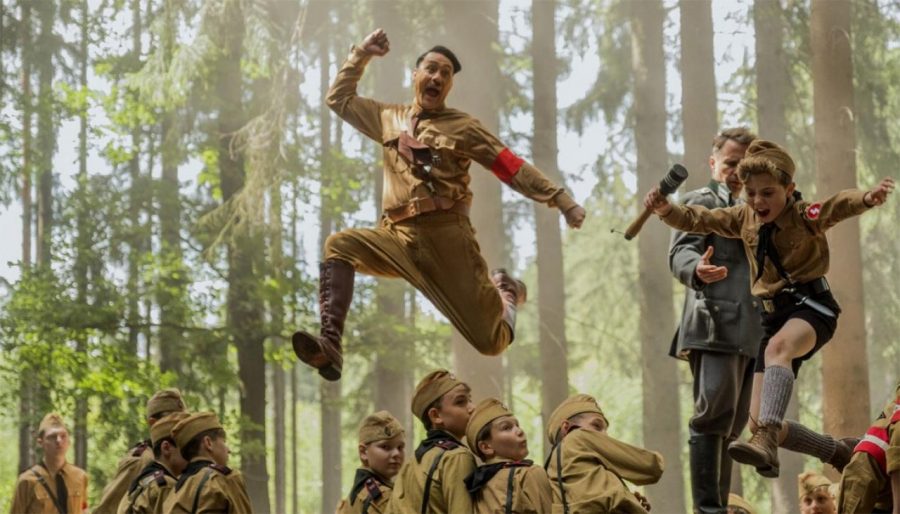‘Jojo Rabbit’: Satirizing the Holocaust
Natalie Tabibian and Kayla Nickfardjam
Staff Writers
This past Yom Kippur, two people were murdered outside a synagogue in Halle, Germany. The perpetrator was an avid Holocaust denier, who spoke in a livestream preceding the attack about the societal problems caused by “the Jew.” His goal: “to kill as many anti-Whites as possible, Jews preferred.” Nine days later, Jojo Rabbit, a satire about the Holocaust, was released.
Unlike the majority of foreboding, dismal Holocaust films, the movie begins with a ten-year-old boy, Jojo, excited for what seems like a summer camp with his best friend. But instead of a summer camp, the audience comes to realize that the setting is actually a Hitler Youth training program. When an awkward and cowardly Jojo is taunted by his peers, his imaginary confidant, Hitler, guides him.
Jojo’s ignorance and naivety about the Jews, combined with the desire to be accepted, is what causes his hatred. However, after discovering a Jew hiding in his home, his views come into question and he makes an unlikely friend. The Jew, a teenage girl named Elsa has been taken in by Jojo’s mother, who hides her within a secret wall during the war. Elsa tells Jojo that he is not a Nazi, but a “ten–year-old kid who likes dressing up in a funny uniform and wants to be part of a club.” To Hitler’s dismay, he reports that she does not seem like a bad person and eventually abandons the Nazi ideology all together. Taika Waititi, the film’s Jewish writer-director, plays Hitler. The Metro Weekly said that “Jojo Rabbit isn’t an anti-Nazi film, it’s not an anti-war film, it’s a movie about why and how we hate, and how that hate blinds us to reality.” It is made clear from the start that the comedic aspects of the movie are not meant to satirize the Holocaust itself, but the ridiculousness of the ideology that propelled it.
The dark elements that occur in the film prevent the movie from seeming insensitive to one of the greatest tragedies of all time and remind the viewer about the true horrors of Nazi Germany and how hatred to such a degree was cultivated. However, this message can only be conveyed to those who have some previous understanding of the extent of the atrocities. To the growing number of Holocaust deniers, the ridiculousness of the beliefs held by the general public and perceived exaggeration could further fuel their unfounded and damaging claims that the entire genocide was a hoax. The question for the audience still remains: is it appropriate to make such a movie at a time when miseducation and hate are rampant?
Yet, Waititi cites rising anti-Semitism as a motivation for the film explaining that it makes “Jojo’s story even more relevant.” Further, he notes the mass amount of people ignorant about the events of the Holocaust, in a poll where “66 per cent millennials didn’t understand the relevance of Auschwitz.” As such, he finds it “vital that we [remind] people of what happened.” Waititi also cites the Charlie Chaplin film The Great Dictator as his inspiration for melding the worlds of Nazi Germany and comedy.
It is Jojo Rabbit’s unconventional approach which differentiates the movie from others of its kind. The film’s use of humor to bring light to tragedy challenges the ways in which storytelling about such somber events can be expressed. While the satirical tone might lead one to believe that the film is inherently offensive or disrespectful to the Jews of the Holocaust, Jojo Rabbit actually critiques the hate and prejudice that fueled their subjugation.

Natalie Tabibian is excited to spend her senior year as Co-Editor-In-Chief! After joining The Roar in her sophomore year, she has written a variety of...

Kayla is a senior at Milken and the Co-Editor-in-Chief for The Roar. Kayla joined The Roar in her sophomore year and since then has enjoyed writing about...



